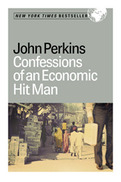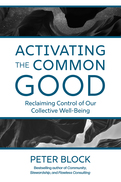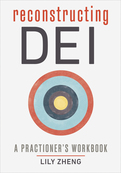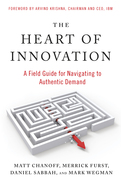Confessions of an Economic Hit Man - John Perkins Interview on DVD
Democracy Now (Author) | John Perkins (Author)
Publication date: 04/21/2005
Summary
Amy Goodman's radio and TV show, Democracy Now, was th
Amy Goodman's radio and TV show, Democracy Now, was the first broadcast media outlet to recognize the importance of Confessions of an Economic Hit Man and to have John Perkins on as a guest. Goodman's hour-long interview was instrumental in bringing the book to the attention of a wide audience and making it a national bestseller.
Now the Amy Goodman interview is available on DVD
Under Goodman's intelligent, probing questioning, Perkins expands on the themes in the book, discussing his experiences all over the world as an economic hit man, his friendship with Omar Torijos, the involvement of people like Robert McNamara and George Schultz, and how he came to write this extraordinary book.
Find out more about our Bulk Buyer Program
- 10-49: 20% discount
- 50-99: 35% discount
- 100-999: 38% discount
- 1000-1999: 40% discount
- 2000+ Contact Leslie Davis ( [email protected] )
Summary
Amy Goodman's radio and TV show, Democracy Now, was th
Amy Goodman's radio and TV show, Democracy Now, was the first broadcast media outlet to recognize the importance of Confessions of an Economic Hit Man and to have John Perkins on as a guest. Goodman's hour-long interview was instrumental in bringing the book to the attention of a wide audience and making it a national bestseller.
Now the Amy Goodman interview is available on DVD
Under Goodman's intelligent, probing questioning, Perkins expands on the themes in the book, discussing his experiences all over the world as an economic hit man, his friendship with Omar Torijos, the involvement of people like Robert McNamara and George Schultz, and how he came to write this extraordinary book.
CHAPTER 1
An Economic Hit Man Is Born
It began innocently enough.
I was an only child, born into the middle class in 1945. Both my parents came from three centuries of New England Yankee stock; their strict, moralistic, staunchly Republican attitudes reflected generations of puritanical ancestors. They were the first in their families to attend college—on scholarships. My mother became a high school Latin teacher. My father joined World War II as a Navy lieutenant and was in charge of the armed guard gun crew on a highly flammable merchant marine tanker in the Atlantic. When I was born, in Hanover, New Hampshire, he was recuperating from a broken hip in a Texas hospital. I did not see him until I was a year old.
He took a job teaching languages at Tilton School, a boys’ boarding school in rural New Hampshire. The campus stood high on a hill, proudly—some would say arrogantly—towering over the town of the same name. This exclusive institution limited its enrollment to about fifty students in each grade level, nine through twelve. The students were mostly the scions of wealthy families from Buenos Aires, Caracas, Boston, and New York.
My family was cash starved; however, we most certainly did not see ourselves as poor. Although the school’s teachers received very little salary, all our needs were provided free: food, housing, heat, water, and the workers who mowed our lawn and shoveled our snow. Beginning on my fourth birthday, I ate in the prep school dining room, shagged balls for the soccer teams my dad coached, and handed out towels in the locker room.
It is an understatement to say that the teachers and their wives felt superior to the locals. I used to hear my parents joking about being the lords of the manor, ruling over the lowly peasants—the townies. I knew it was more than a joke.
My elementary and middle school friends belonged to that peasant class; they were very poor. Their parents were dirt farmers, lumber-jacks, and mill workers. They resented “the preppies on the hill,” and in turn, my father and mother discouraged me from socializing with the townie girls, who they called “tarts” and “sluts.” I had shared schoolbooks and crayons with these girls since first grade, and over the years, I fell in love with three of them: Ann, Priscilla, and Judy. I had a hard time understanding my parents’ perspective; however, I deferred to their wishes.
Every year we spent the three months of my dad’s summer vacation at a lake cottage built by my grandfather in 1921. It was surrounded by forests, and at night we could hear owls and mountain lions. We had no neighbors; I was the only child within walking distance. In the early years, I passed the days by pretending that the trees were knights of the Round Table and damsels in distress named Ann, Priscilla, or Judy (depending on the year). My passion was, I had no doubt, as strong as that of Lancelot for Guinevere—and even more secretive.
At fourteen, I received free tuition to Tilton School. With my parents’ prodding, I rejected everything to do with the town and never saw my old friends again. When my new classmates went home to their mansions and penthouses for vacation, I remained alone on the hill. Their girlfriends were debutantes; I had no girlfriends. All the girls I knew were “sluts”; I had cast them off, and they had forgotten me. I was alone—and terribly frustrated.
My parents were masters at manipulation; they assured me that I was privileged to have such an opportunity and that some day I would be grateful. I would find the perfect wife, one suited to our high moral standards. Inside, though, I seethed. I craved female companionship—sex; the idea of a slut was most alluring.
However, rather than rebelling, I repressed my rage and expressed my frustration by excelling. I was an honor student, captain of two varsity teams, editor of the school newspaper. I was determined to show up my rich classmates and to leave Tilton behind forever. During my senior year, I was awarded a full athletic scholarship to Brown and an academic scholarship to Middlebury. I chose Brown, mainly because I preferred being an athlete—and because it was located in a city. My mother had graduated from Middlebury and my father had received his master’s degree there, so even though Brown was in the Ivy League, they preferred Middlebury.
“What if you break your leg?” my father asked. “Better to take the academic scholarship.” I buckled.
Middlebury was, in my perception, merely an inflated version of Tilton—albeit in rural Vermont instead of rural New Hampshire. True, it was coed, but I was poor and most everyone else was wealthy, and I had not attended school with a female in four years. I lacked confidence, felt outclassed, was miserable. I pleaded with my dad to let me drop out or take a year off. I wanted to move to Boston and learn about life and women. He would not hear of it. “How can I pretend to prepare other parents’ kids for college if my own won’t stay in one?” he asked.
I have come to understand that life is composed of a series of coincidences. How we react to these—how we exercise what some refer to as free will—is everything; the choices we make within the boundaries of the twists of fate determine who we are. Two major coincidences that shaped my life occurred at Middlebury. One came in the form of an Iranian, the son of a general who was a personal advisor to the shah; the other was a beautiful young woman named Ann, like my childhood sweetheart.
The first, whom I will call Farhad, had played professional soccer in Rome. He was endowed with an athletic physique, curly black hair, soft walnut eyes, and a background and charisma that made him irresistible to women. He was my opposite in many ways. I worked hard to win his friendship, and he taught me many things that would serve me well in the years to come. I also met Ann. Although she was seriously dating a young man who attended another college, she took me under her wing. Our platonic relationship was the first truly loving one I had ever experienced.
Farhad encouraged me to drink, party, and ignore my parents. I consciously chose to stop studying. I decided I would break my academic leg to get even with my father. My grades plummeted; I lost my scholarship. Halfway through my sophomore year, I elected to drop out. My father threatened to disown me; Farhad egged me on. I stormed into the dean’s office and quit school. It was a pivotal moment in my life.
Farhad and I celebrated my last night in town together at a local bar. A drunken farmer, a giant of a man, accused me of flirting with his wife, picked me up off my feet, and hurled me against a wall. Farhad stepped between us, drew a knife, and slashed the farmer open at the cheek. Then he dragged me across the room and shoved me through a window, out onto a ledge high above Otter Creek. We jumped and made our way along the river and back to our dorm.
The next morning, when interrogated by the campus police, I lied and refused to admit any knowledge of the incident. Nevertheless, Farhad was expelled. We both moved to Boston and shared an apartment there. I landed a job at Hearst’s Record American/Sunday Advertiser newspapers, as a personal assistant to the editor in chief of the Sunday Advertiser.
Later that year, 1965, several of my friends at the newspaper were drafted. To avoid a similar fate, I entered Boston University’s College of Business Administration. By then, Ann had broken up with her old boyfriend, and she often traveled down from Middlebury to visit. I welcomed her attention. She graduated in 1967, while I still had another year to complete at BU. She adamantly refused to move in with me until we were married. Although I joked about being blackmailed, and in fact did resent what I saw as a continuation of my parents’ archaic and prudish set of moral standards, I enjoyed our times together and I wanted more. We married.
Ann’s father, a brilliant engineer, had masterminded the navigational system for an important class of missile and was rewarded with a high-level position in the Department of the Navy. His best friend, a man Ann called Uncle Frank (not his real name), was employed as an executive at the highest echelons of the National Security Agency (NSA), the country’s least-known—and by most accounts largest—spy organization.
Shortly after our marriage, the military summoned me for my physical. I passed and therefore faced the prospect of Vietnam upon graduation. The idea of fighting in Southeast Asia tore me apart emotionally, though war has always fascinated me. I was raised on tales about my colonial ancestors—who include Thomas Paine and Ethan Allen—and I had visited all the New England and upstate New York battle sites of both the French and Indian and the Revolutionary wars. I read every historical novel I could find. In fact, when Army Special Forces units first entered Southeast Asia, I was eager to sign up. But as the media exposed the atrocities and the inconsistencies of U.S. policy, I experienced a change of heart. I found myself wondering whose side Paine would have taken. I was sure he would have joined our Vietcong enemies.
Uncle Frank came to my rescue. He informed me that an NSA job made one eligible for draft deferment, and he arranged for a series of meetings at his agency, including a day of grueling polygraph-monitored interviews. I was told that these tests would determine whether I was suitable material for NSA recruitment and training, and if I was, would provide a profile of my strengths and weaknesses, which would be used to map out my career. Given my attitude toward the Vietnam War, I was convinced I would fail the tests.
Under examination, I admitted that as a loyal American I opposed the war, and I was surprised when the interviewers did not pursue this subject. Instead, they focused on my upbringing, my attitudes toward my parents, the emotions generated by the fact I grew up as a poor puritan among so many wealthy, hedonistic preppies. They also explored my frustration about the lack of women, sex, and money in my life, and the fantasy world that had evolved as a result. I was amazed by the attention they gave to my relationship with Farhad and by their interest in my willingness to lie to the campus police to protect him.
At first I assumed all these things that seemed so negative to me marked me as an NSA reject, but the interviews continued, suggesting otherwise. It was not until several years later that I realized that from an NSA viewpoint these negatives actually are positive. Their assessment had less to do with issues of loyalty to my country than with the frustrations of my life. Anger at my parents, an obsession with women, and my ambition to live the good life gave them a hook; I was seducible. My determination to excel in school and in sports, my ultimate rebellion against my father, my ability to get along with foreigners, and my willingness to lie to the police were exactly the types of attributes they sought. I also discovered, later, that Farhad’s father worked for the U.S. intelligence community in Iran; my friendship with Farhad was therefore a definite plus.
A few weeks after the NSA testing, I was offered a job to start training in the art of spying, to begin after I received my degree from BU several months later. However, before I had officially accepted this offer, I impulsively attended a seminar given at BU by a Peace Corps recruiter. A major selling point was that, like the NSA, Peace Corps jobs made one eligible for draft deferments.
The decision to sit in on that seminar was one of those coincidences that seemed insignificant at the time but turned out to have life-changing implications. The recruiter described several places in the world that especially needed volunteers. One of these was the Amazon rain forest where, he pointed out, indigenous people lived very much as natives of North America had until the arrival of Europeans.
I had always dreamed of living like the Abnakis who inhabited New Hampshire when my ancestors first settled there. I knew I had Abnaki blood in my veins, and I wanted to learn the type of forest lore they understood so well. I approached the recruiter after his talk and asked about the possibility of being assigned to the Amazon. He assured me there was a great need for volunteers in that region and that my chances would be excellent. I called Uncle Frank.
To my surprise, Uncle Frank encouraged me to consider the Peace Corps. He confided that after the fall of Hanoi—which in those days was deemed a certainty by men in his position—the Amazon would become a hot spot.
“Loaded with oil,” he said. “We’ll need good agents there—people who understand the natives.” He assured me that the Peace Corps would be an excellent training ground, and he urged me to become proficient in Spanish as well as in local indigenous dialects. “You might,” he chuckled, “end up working for a private company instead of the government.”
I did not understand what he meant by that at the time. I was being upgraded from spy to EHM, although I had never heard the term and would not for a few more years. I had no idea that there were hundreds of men and women scattered around the world, working for consulting firms and other private companies, people who never received a penny of salary from any government agency and yet were serving the interests of empire. Nor could I have guessed that a new type, with more euphemistic titles, would number in the thousands by the end of the millennium, and that I would play a significant role in shaping this growing army.
Ann and I applied to the Peace Corps and requested an assignment in the Amazon. When our acceptance notification arrived, my first reaction was one of extreme disappointment. The letter stated that we would be sent to Ecuador.
Oh no, I thought. I requested the Amazon, not Africa.
I went to an atlas and looked up Ecuador. I was dismayed when I could not find it anywhere on the African continent. In the index, though, I discovered that it is indeed located in Latin America, and I saw on the map that the river systems flowing off its Andean glaciers form the headwaters to the mighty Amazon. Further reading assured me that Ecuador’s jungles were some of the world’s most diverse and formidable, and that the indigenous people still lived much as they had for millennia. We accepted.
Ann and I completed Peace Corps training in Southern California and headed for Ecuador in September 1968. We lived in the Amazon with the Shuar whose lifestyle did indeed resemble that of precolonial North American natives; we also worked in the Andes with descendants of the Incas. It was a side of the world I never dreamed still existed. Until then, the only Latin Americans I had met were the wealthy preppies at the school where my father taught. I found myself sympathizing with these indigenous people who subsisted on hunting and farming. I felt an odd sort of kinship with them. Somehow, they reminded me of the townies I had left behind.
One day a man in a business suit, Einar Greve, landed at the airstrip in our community. He was a vice president at Chas. T. Main, Inc. (MAIN), an international consulting firm that kept a very low profile and that was in charge of studies to determine whether the World Bank should lend Ecuador and its neighboring countries billions of dollars to build hydroelectric dams and other infrastructure projects. Einar also was a colonel in the U.S. Army Reserve.
He started talking with me about the benefits of working for a company like MAIN. When I mentioned that I had been accepted by the NSA before joining the Peace Corps, and that I was considering going back to them, he informed me that he sometimes acted as an NSA liaison; he gave me a look that made me suspect that part of his assignment was to evaluate my capabilities. I now believe that he was updating my profile, and especially sizing up my abilities to survive in environments most North Americans would find hostile.
We spent a couple of days together in Ecuador, and afterward communicated by mail. He asked me to send him reports assessing Ecuador’s economic prospects. I had a small portable typewriter, loved to write, and was quite happy to comply with this request. Over a period of about a year, I sent Einar at least fifteen long letters. In these letters, I speculated on Ecuador’s economic and political future, and I appraised the growing frustration among the indigenous communities as they struggled to confront oil companies, international development agencies, and other attempts to draw them into the modern world.
When my Peace Corps tour was over, Einar invited me to a job interview at MAIN headquarters in Boston. During our private meeting, he emphasized that MAIN’s primary business was engineering but that his biggest client, the World Bank, recently had begun insisting that he keep economists on staff to produce the critical economic forecasts used to determine the feasibility and magnitude of engineering projects. He confided that he had previously hired three highly qualified economists with impeccable credentials—two with master’s degrees and one with a PhD. They had failed miserably.
“None of them,” Einar said, “can handle the idea of producing economic forecasts in countries where reliable statistics aren’t available.” He went on to tell me that, in addition, all of them had found it impossible to fulfill the terms of their contracts, which required them to travel to remote places in countries like Ecuador, Indonesia, Iran, and Egypt, to interview local leaders, and to provide personal assessments about the prospects for economic development in those regions. One had suffered a nervous breakdown in an isolated Panamanian village; he was escorted by Panamanian police to the airport and put on a plane back to the United States.
“The letters you sent me indicate that you don’t mind sticking your neck out, even when hard data isn’t available. And given your living conditions in Ecuador, I’m confident you can survive almost anywhere.” He told me that he already had fired one of those economists and was prepared to do the same with the other two, if I accepted the job.
So it was that in January 1971 I was offered a position as an economist with MAIN. I had turned twenty-six—the magical age when the draft board no longer wanted me. I consulted with Ann’s family; they encouraged me to take the job, and I assumed this reflected Uncle Frank’s attitude as well. I recalled him mentioning the possibility I would end up working for a private firm. Nothing was ever stated openly, but I had no doubt that my employment at MAIN was a consequence of the arrangements Uncle Frank had made three years earlier, in addition to my experiences in Ecuador and my willingness to write about that country’s economic and political situation.
My head reeled for several weeks, and I had a very swollen ego. I had earned only a bachelor’s degree from BU, which did not seem to warrant a position as an economist with such a lofty consulting company. I knew that many of my BU classmates who had been rejected by the draft and had gone on to earn MBAs and other graduate degrees would be overcome with jealousy. I visualized myself as a dashing secret agent, heading off to exotic lands, lounging beside hotel swimming pools, surrounded by gorgeous bikini-clad women, martini in hand.
Although this was merely fantasy, I would discover that it held elements of truth. Einar had hired me as an economist, but I was soon to learn that my real job went far beyond that, and that it was in fact closer to James Bond’s than I ever could have guessed.














